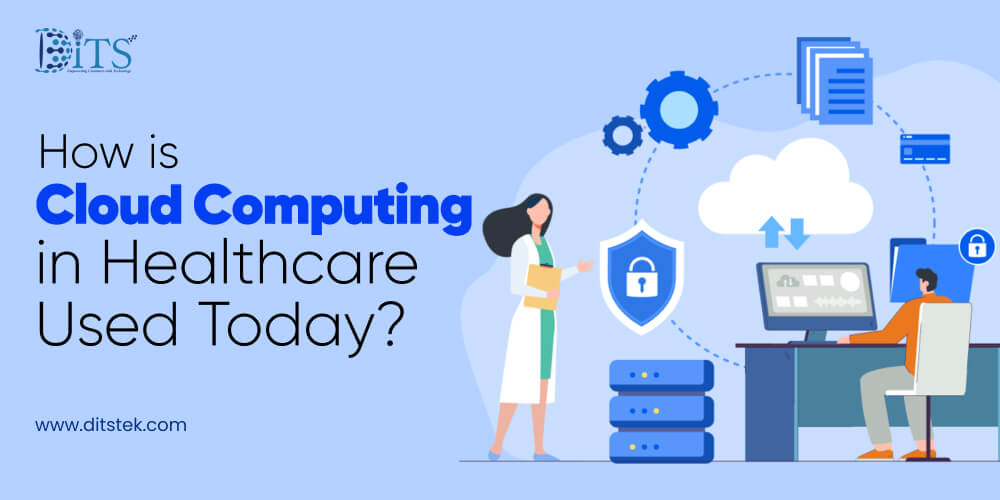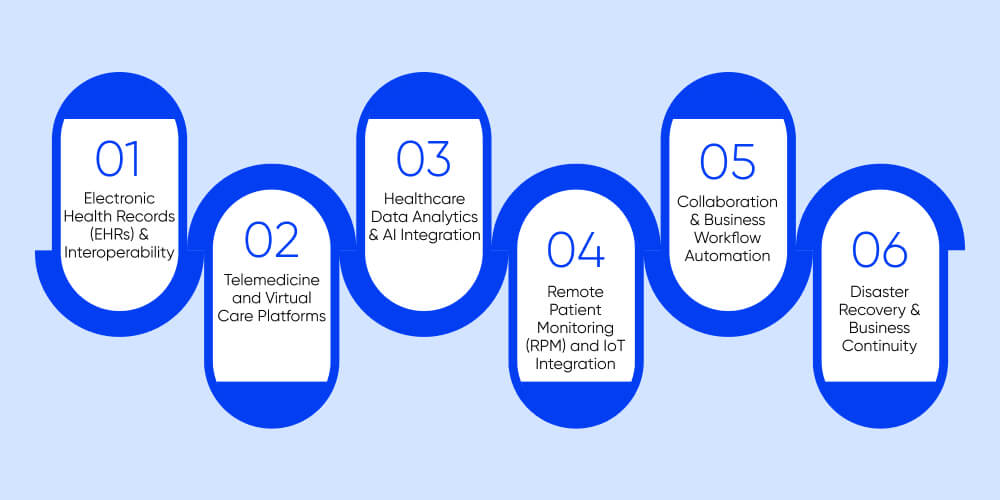How is Cloud Computing in Healthcare Used Today?
Table Of Content
Published Date :
09 Sep 2025
The healthcare industry is evolving rapidly by leveraging innovative technologies, with cloud technology at its center. Simply put, healthcare cloud computing refers to the use of remote servers and internet-based services to store, manage, and process healthcare data, rather than relying on traditional on-premise systems.
For healthcare businesses and organizations supporting the industry, such as insurers, technology providers, and research firms, the shift to cloud offers far more than storage efficiency. It enables secure data sharing, supports telemedicine platforms, powers real-time analytics, and ensures compliance with strict healthcare regulations. This blog examines the current use of cloud computing in healthcare, its applications, benefits, and implications for the industry's future.
Want to Improve Data Security in Healthcare?
Encryption, HIPAA compliance, and real-time monitoring—cloud platforms ensure data integrity. Secure your business against breaches with cloud adoption designed for healthcare organizations.
Why Cloud Computing in Healthcare Matters for Businesses
According to recent reports, the global healthcare cloud computing market is expected to surpass $89 billion by 2027. Healthcare businesses today face increasing pressure to deliver efficient services, comply with regulations, and adapt to evolving patient and industry needs. Traditional IT infrastructures often struggle to keep up with these demands.
This is where cloud computing in healthcare becomes a game-changer. By moving critical processes and systems to the cloud, healthcare organizations can unlock new opportunities for innovation, cost efficiency, and growth.
Cloud systems allow healthcare providers to move away from expensive, hardware-heavy setups. The pay-as-you-go model ensures better financial control while reducing operational risks. Cloud adoption also ensures compliance with regulations like HIPAA and GDPR, as most leading platforms offer built-in security and encryption measures. Another key advantage is interoperability—making it easier to connect EHR systems, labs, pharmacies, and insurance platforms for seamless data exchange.
Additionally, cloud infrastructure provides scalability to handle sudden spikes in demand, such as during pandemics or seasonal surges. For insurers and technology vendors, the cloud also enables advanced data analytics, AI integration, and personalized healthcare offerings. Finally, disaster recovery tools ensure uninterrupted services, protecting organizations against data breaches and unexpected outages.
Key Applications of Cloud Computing in Healthcare Today

The role of cloud computing in healthcare goes beyond storage and cost savings. It is shaping how healthcare organizations deliver services, manage data, and collaborate across the ecosystem. From streamlining patient records to enabling real-time virtual care, cloud adoption is driving a new era of innovation. Below are some of the most impactful cloud computing applications in healthcare today.
Electronic Health Records (EHRs) & Interoperability
One of the most important cloud computing use cases in healthcare is the management of electronic health records (EHRs). Traditional systems often limited access to data, making collaboration between providers, labs, and insurers difficult. Cloud-based EHR platforms solve this by creating centralized, secure, and easily accessible databases.
For healthcare organizations, this means faster access to critical information, reduced duplication of tests, and improved communication across departments. Interoperability ensures patient data can be exchanged seamlessly while meeting standards like HL7 and FHIR.
This boosts efficiency and supports higher-quality care delivery across the healthcare value chain. Increasingly, providers are looking to adopt cloud based EMR and behavioral health electronic records platforms to ensure compliance, scalability, and seamless integration across facilities.
Telemedicine and Virtual Care Platforms
Another major driver of the cloud computing in healthcare industry is the rise of telemedicine and virtual care. Cloud infrastructure makes it possible for healthcare businesses to deliver secure, real-time consultations and remote care without heavy investments in on-premise systems.
Providers gain scalability to handle sudden surges in appointments, while cloud platforms integrate with video conferencing, digital prescriptions, and billing systems for a complete virtual care ecosystem. For allied businesses such as telehealth vendors and insurers, cloud based telehealth app development enables faster go-to-market, stronger patient engagement, and secure virtual care delivery.
Healthcare Data Analytics & AI Integration
One of the most transformative cloud computing applications in healthcare is advanced analytics powered by AI. Healthcare businesses generate vast data from EHRs, claims, imaging, and wearables, which is costly to manage on traditional systems.
Cloud platforms enable real-time storage and processing of these datasets. This supports predictive analytics for disease trends, population health, and personalized treatment. By integrating AI within the cloud, businesses gain actionable insights that reduce errors, optimize treatments, and enhance outcomes.
At DITS, we integrate AI into every solution—covering software development, quality assurance, code quality, and customization—ensuring healthcare platforms are secure, intelligent, and future-ready. For healthcare payers, coupling analytics with healthcare RCM software ensures claims processing and revenue cycle management become more efficient and accurate.
Remote Patient Monitoring (RPM) and IoT Integration
A critical cloud computing use case in healthcare is the integration of RPM and IoT devices. Wearable sensors, smart medical tools, and home-monitoring devices produce constant data that needs secure, scalable management.
Cloud platforms capture and analyze this information in real time, helping providers and insurers track patient vitals, recovery, and adherence to treatment. This proactive care reduces hospital readmissions and improves outcomes. For vendors, cloud-powered IoT integration creates opportunities to build custom healthcare solutions that are compliant, scalable, and interoperable.
Collaboration & Business Workflow Automation
The role of healthcare cloud also includes transforming collaboration and automating workflows. Many organizations face silos across departments and partners like insurers or labs. Cloud platforms eliminate these barriers by offering centralized access to secure communication tools and real-time data sharing.
Additionally, business workflow automation in the cloud streamlines tasks like claims processing, billing, and scheduling. This reduces manual errors and frees up resources for strategic initiatives, enabling providers and technology vendors to achieve greater efficiency.
Disaster Recovery & Business Continuity
One of the essential cloud computing applications in healthcare is disaster recovery. Healthcare businesses cannot afford downtime, and cloud-based backups safeguard operations against cyberattacks, system failures, and natural disasters.
With automated backups and geographically distributed servers, cloud systems ensure rapid recovery and minimal data loss. This strengthens trust while maintaining compliance with HIPAA and GDPR, offering a reliable safeguard for mission-critical operations.
Interested in Cloud-Based Telemedicine Growth?
Virtual care is transforming patient engagement. Leverage cloud to integrate telemedicine apps, digital prescriptions, and remote consultations without heavy upfront costs.
Benefits of Cloud Computing for Healthcare Businesses
The benefits of healthcare cloud computing extend well beyond data storage. For healthcare businesses, providers, and insurers, cloud adoption delivers measurable advantages.
It reduces IT expenses through pay-as-you-go pricing while providing advanced security features like encryption and monitoring. Scalability ensures organizations can adapt during sudden patient surges or expansions. Cloud systems also accelerate innovation, making it easier to deploy new tools, integrate AI, and improve experiences.
Collaboration is enhanced as data sharing becomes secure and seamless, and disaster recovery ensures operations remain uninterrupted. Together, these benefits create a foundation for sustainable growth and digital transformation.
Challenges and Considerations in Adopting Cloud in Healthcare
While the benefits of healthcare cloud computing are clear, businesses must also navigate challenges. Data security and compliance with HIPAA and GDPR remain critical concerns. Integration with legacy systems can be complex, and vendor lock-in may create migration difficulties.
Cybersecurity threats require strong governance, audits, and monitoring. Balancing costs with innovation is another challenge, as advanced cloud features add expenses. Finally, cultural readiness is vital—staff training and digital-first operations must align with cloud adoption to ensure success.
Want to Automate Healthcare Workflows Effectively?
Cloud automation streamlines claims, billing, and scheduling, reducing manual errors. Free your team to focus on patient care and innovation.
How DITS Supports Cloud-Driven Healthcare Transformation
At DITS, we know that cloud adoption in healthcare requires more than technology—it requires tailored strategies. We design custom healthcare solutions that align with each organization’s needs while ensuring compliance and scalability.
Our expertise includes migrating legacy systems, deploying cloud-native architectures, and enabling interoperability. We also enhance operations through business workflow automation, streamlining claims, scheduling, and data exchange across providers and payers.
What sets us apart is our integration of AI at every stage of development. From maintaining code quality to enabling intelligent customization, we ensure solutions are secure, scalable, and future-ready. Whether it’s telemedicine, analytics, or remote monitoring, DITS helps healthcare businesses harness the full potential of the cloud.
Conclusion
Cloud adoption is no longer optional for healthcare businesses—it has become a critical driver of innovation, efficiency, and resilience. The role of healthcare cloud computing spans EHRs, telemedicine, analytics, IoT, and more, ensuring scalability and compliance.
As the future of cloud computing in healthcare evolves, organizations that embrace it will reduce costs, improve outcomes, and unlock growth opportunities. By investing in secure and intelligent cloud platforms, healthcare businesses can move beyond traditional IT barriers and build a stronger foundation for digital success.
FAQs
1. What is cloud computing in healthcare?
It refers to the use of internet-based servers and services to store, process, and manage healthcare data. Instead of relying on on-premise systems, healthcare businesses use cloud platforms to improve efficiency, scalability, and compliance.
2. How is cloud computing used in healthcare?
Cloud technology supports multiple areas in healthcare, including electronic health records, telemedicine, remote patient monitoring, and advanced data analytics. It helps providers and allied businesses improve collaboration, enhance patient outcomes, and ensure business continuity.
3. How does cloud computing improve data security for healthcare businesses?
Cloud providers use encryption, access controls, and monitoring to safeguard sensitive data while meeting HIPAA and GDPR standards, ensuring businesses remain compliant.
4. What are the cost benefits of using cloud platforms in healthcare?
Cloud solutions eliminate the need for expensive on-premise hardware. The pay-as-you-go model helps businesses reduce IT overhead while scaling resources as needed.
5. How can cloud computing support healthcare startups and vendors?
For startups, the cloud computing in healthcare industry offers faster deployment, scalability, and integration with third-party tools, enabling innovation without heavy upfront costs.
6. Which cloud model (public, private, hybrid) works best for healthcare organizations?
It depends on business needs: public cloud provides scalability, private cloud offers more control, while hybrid combines both for flexibility and compliance.
7. What are the main business benefits of adopting cloud computing in healthcare?
Healthcare businesses gain cost savings, improved scalability, streamlined operations, faster innovation, and better collaboration with partners such as insurers and labs.
8. How can cloud computing improve interoperability for healthcare businesses?
Cloud platforms enable seamless data exchange across systems like EHRs, labs, and insurance platforms, ensuring data accuracy and reducing inefficiencies.
9. Is cloud adoption suitable for small and mid-sized healthcare businesses?
Yes. The flexible pricing models allow smaller organizations to leverage advanced cloud solutions without significant upfront investments, helping them stay competitive.
10. How does cloud computing impact compliance and audits for healthcare organizations?
Cloud providers offer built-in compliance support, including encryption, secure storage, and audit trails, which simplifies regulatory reporting and reduces risks.

Nidhi Thakur
With more than 19 years of experience - I represent a team of professionals that specializes in the healthcare and business and workflow automation domains. The team consists of experienced full-stack developers supported by senior system analysts who have developed multiple bespoke applications for Healthcare, Business Automation, Retail, IOT, Ed-tech domains for startups and Enterprise Level clients.
Recent Posts

From real-time tracking to proactive maintenance, IoT offers significant benefits for fleet management. Dive into IoT fleet management use cases and advantages in this blog.

A strategic overview of how mining-focused project management software improves cost control, resource planning, visibility, and executive decision-making across complex, multi-site mining operations globally today.

From basic monitoring to enterprise-wide control, energy management system costs depend on your needs. Here’s what influences pricing.
 Doha Exhibition and Convention Center (DECC)
Doha Exhibition and Convention Center (DECC)